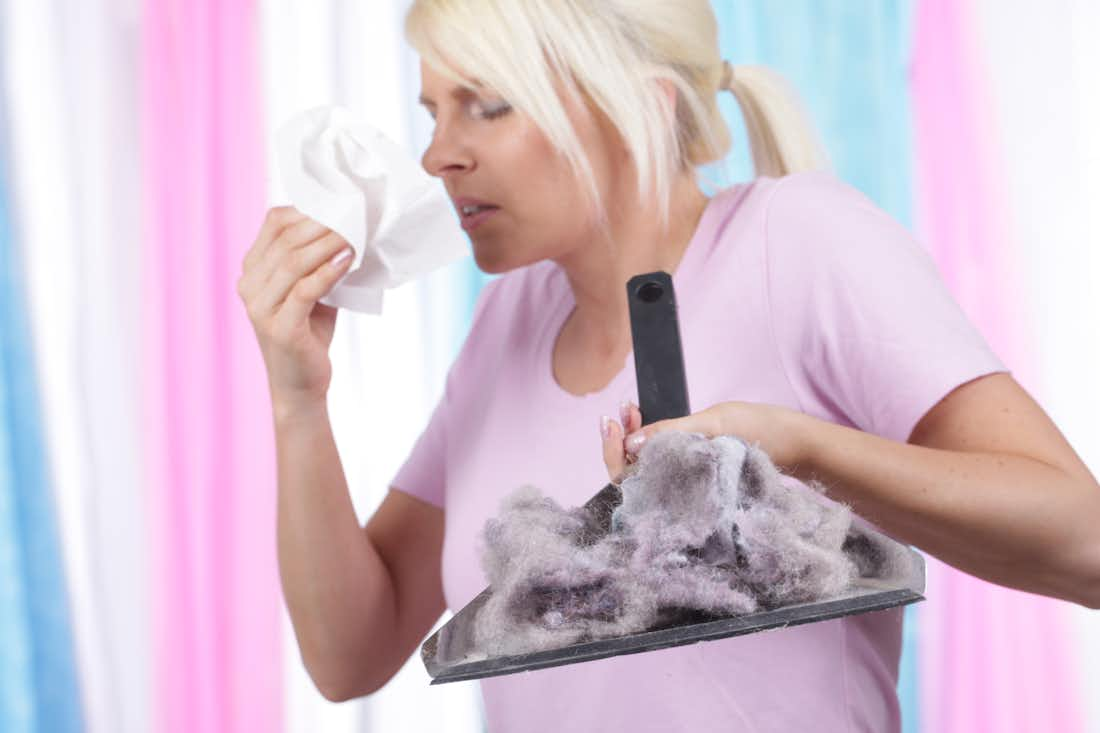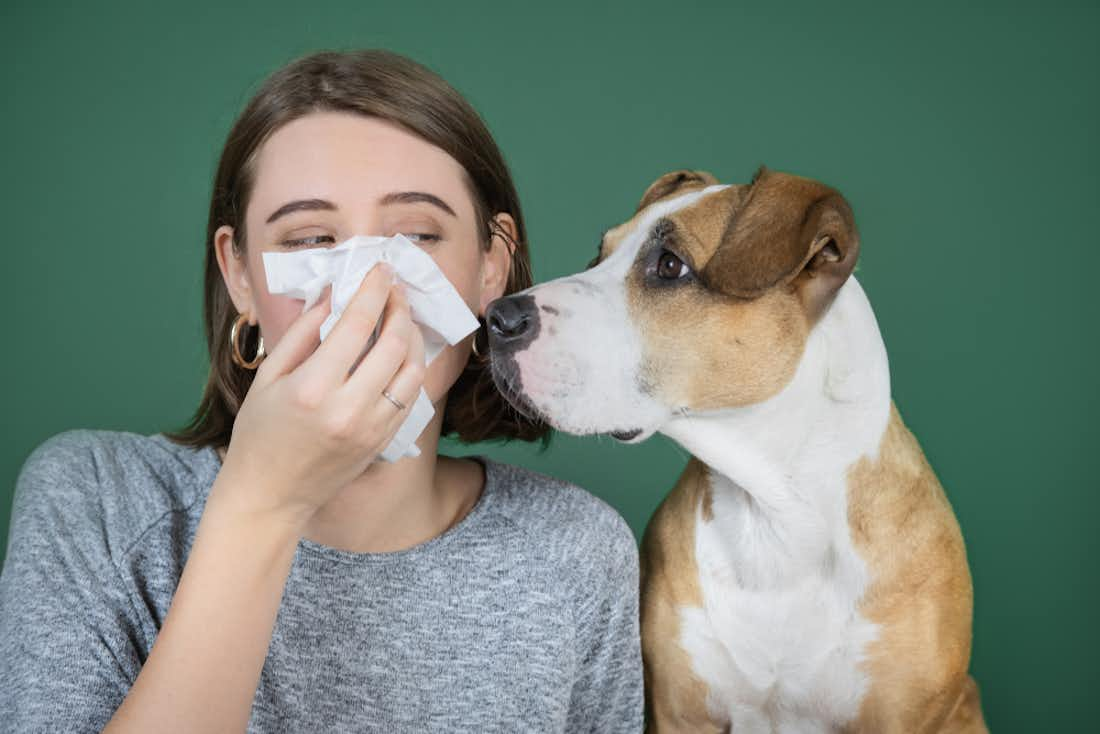Nov 4, 2021
Why Do My Allergies Get Worse at Night?
6 minute read
For allergy sufferers, the daytime is a nightmare. Even while the sun shines, allergens like pollen and ragweed are blowing through the air, into the immune system, and causing a stir.
The good news is that once the sun goes down, the allergens hibernate until the following day. Or… do they? For many people, allergy symptoms become even worse when the day turns to night.
So why is that? What causes allergies to get worse at night despite being snuggled up in bed? The answer might be right under your nose…
Not So Sweet Dreams
The only thing worse than waking up in the middle of the night thirsty is waking up sneezing. And several potential allergens might be messing up your nighttime routine. Namely, these are triggers that are living within your own home.
Dust mites are one of the most common causes of indoor allergens. These are tiny, microscopic, living organisms that love to hide in your bed sheets and linens. Even though you can’t see them, your itchy eyes and congested nose know that they are there. Pet dander is another common allergen that comes from the fur and skin of your furry friends.
Indoor mold is another common cause of indoor allergies. Bathrooms, or areas where warm and damp environments are present, are breeding grounds for mold spores. These can make your allergy symptoms worse at night if your bathroom is close to your bedroom or if you like to relax with a hot bath before bed.
The reason that it may seem like your allergies are getting worse at night is because of where you’re spending most of your time: in bed. If you don’t wash your sheets often or allow your animals to sleep with you, these triggers will likely bring some discomfort and make it seem like your allergies are worsening due to the time of day rather than location.
With that said, there may also be some science behind it. Researchers have found that while pollen counts are typically higher during the day, they are also generally suspended in the warm air at that time. When it cools down, these particles fall closer to the ground and become more potent for your airways.
Why Aren’t My Roommates Sneezing Like Crazy?
If you share your space with roommates or a significant other, yet they’re not experiencing the same symptoms as you, you’re not going crazy. Allergies don’t affect everyone in the same way.
Your immune system protects you from harmful substances like bacteria and viruses by deploying mechanisms to keep them at bay. Things like coughing, sneezing, and watery eyes are a few ways that your body tries to rid you of the nasty stuff.
But sometimes, your immune system may be overactive to certain substances that it perceives as harmful despite being completely harmless. When this happens, it releases a chemical called histamines to get the substance out of you. That’s what causes allergy symptoms, and it only happens if you are allergic to the substance.
That’s why only some people have seasonal allergies, and only some people have food allergies. It’s completely reliant on you as an individual. So, if your roommates are getting a good night’s sleep but you can’t breathe out of your nose, you’re not alone. More than one in six Americans experience some form of indoor or outdoor allergy.
Allergies or Apnea
Even after washing all of your linens and keeping your pets out of your bedroom, you might still notice allergy symptoms. If you’re struggling to breathe, you’re wheezing, or tossing and turning in bed; you might have something else entirely.
Sleep apnea is a potentially serious sleep disorder where your breathing repeatedly stops and starts. Symptoms include gasping for air, loud snoring, and episodes in which you stop breathing during sleep. While it is definitely more severe than allergies, it bears some similarities.
If you suspect you have sleep apnea, it’s important to go to a doctor to get it checked. Alternatively, you can get an allergy test to rule out several different allergens to see what’s the root of the problem. You can avoid a trip to the allergist completely by just taking Cleared’s at-home allergy test to analyze for 40 common indoor and outdoor allergens.
How To Manage Nightly Allergies
Don’t let allergies keep you up at night. There are plenty of ways to combat your triggers so you can finally get a restful night’s sleep.
Antihistamines
Histamines are the chemicals that your body produces when faced with a potential threat. It’s what causes you to sneeze, get itchy eyes, and all that other nasty stuff. Luckily, there’s a medication that can inhibit its production from bringing you relief fast.
These are aptly called antihistamines, and you’ve probably heard of them before. These are your Zyrtec, Claritin, Allegra, and more. They work to help alleviate the symptoms of allergies so that you hardly even notice they’re a thing.
An added benefit of antihistamines is that many (not all) are drowsy medications, meaning they can make you feel sleepy. This might help you get a deeper, more thorough sleep, especially when compared to doing nothing about your symptoms in the first place.
The Cleared shop has all of your favorite generic brand antihistamines at low, low prices.
Avoidance
A surefire way to not get allergies is to eliminate the allergens in the first place. Since dust mites, pet dander, and mold spores are among the most common indoor allergens, you can work to dispose of them by just doing some general housekeeping.
Dust mites%20to%20kill%20the%20mites.) love to live on linens, bedsheets, and soft furniture. Take care to wash your sheets frequently, ensuring that they’re getting run through a dry cycle at 130 degrees Fahrenheit minimum. Also, try to use furniture sprays and cleaners to kill dust mites, then vacuum them up to make sure they can’t irritate you in the slightest. For furniture, vacuuming is the best solution if possible to reduce dust mites.
You can take similar steps for pet dander, but you may also need to make sure your furry friends stay out of your bedroom. As much as they love to snuggle with you, they wouldn’t love to know that they’re causing you pain throughout the night.
As for mold spores, take care to bleach and disinfect areas that are particularly susceptible to moisture or heat. These are things like under your sink, behind your toilet, and under your shower head.
Finally, your outdoor pollen allergies might even be the root of your indoor nightly discomfort. Pollen can stick to your clothes or on the bottom of your shoes, so if you’re bringing these molecules inside, you may also be bringing them to bed with you.
Allergy Immunotherapy
Avoiding allergies can be tricky, and antihistamines only bring temporary relief. If only there were a way actually to tackle the source… oh wait -- there is!
It’s called allergy immunotherapy, and it works by gradually exposing your body to small amounts of an allergen over time to adjust. While the traditional method requires allergy shots, a new method only requires a tablet under your tongue.
Sublingual immunotherapy, or SLIT, is the only FDA-approved way to treat allergies. While it’s a prescription medication, Cleared makes the process hassle-free.
Sweet Dreams
While many people notice a worsening in their allergy symptoms during the day, nighttime allergies are increasingly abundant. And believe it or not, the main causes are usually related to what’s going on inside your own home rather than outside its walls.
Things like pet dander, dust mites, or mold spores can make your bedroom a breeding ground for potent allergens, making your symptoms worsen when you snuggle under the covers. Luckily, things like frequent cleaning and antihistamines can bring some relief.
Ready to lead an allergy-free life? Cleared can help get you there without breaking the bank. From oral antihistamines to nasal sprays, from allergy testing kits to FDA-approved immunotherapy, it’s all a part of our relief mission. Get started today with an allergy consultation!
Sources:
Allergies: Types, Symptoms, Causes & Treatments | Cleveland Clinic.
Sleep apnea - Symptoms and causes | The Mayo Clinic
Dust mite allergy - Diagnosis and treatment | The Mayo Clinic%20to%20kill%20the%20mites.)



